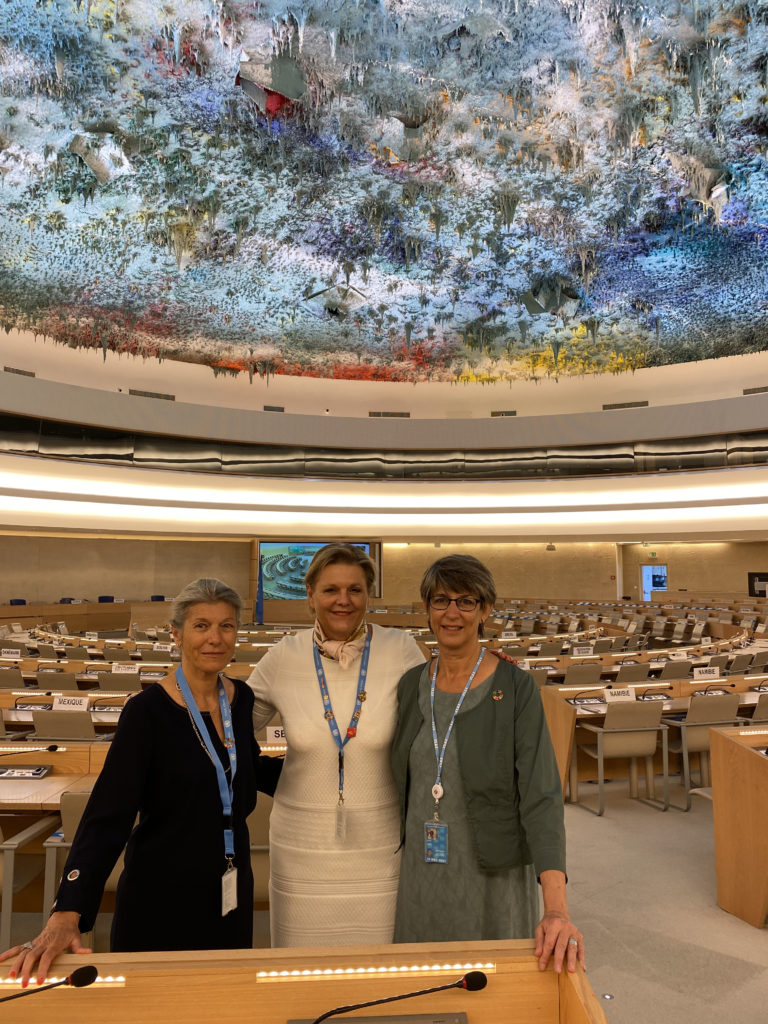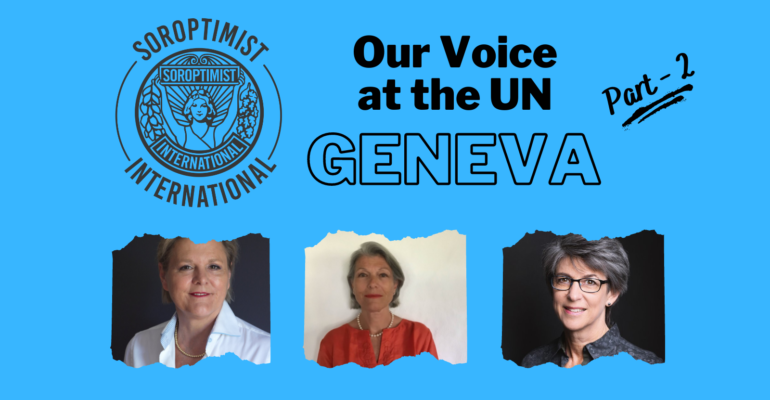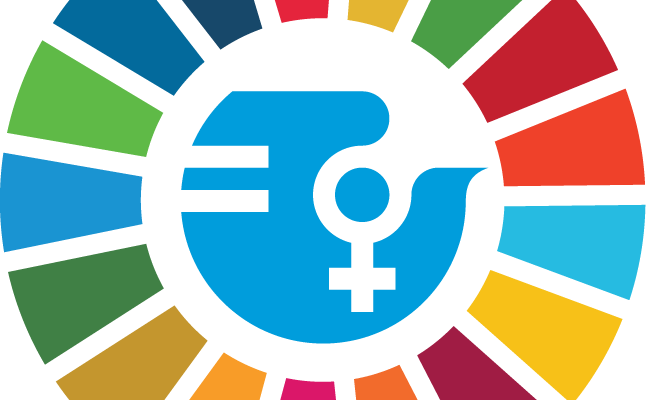Welcome to part 2 of this special edition of ‘Our Voice at the UN’, focussing on the United Nation’s office of Geneva (UNOG).
First up, let’s hear from Berthe, Stacy, and Donatella, as they list their key areas of interest and share some of their hopes for the future:

Left to right: Donatella Benjamin, Berthe De Vos, Stacy Ciulik
- Berthe: I feel honoured to be able to work at the UNOG “the heart of Human Rights” and the home of numerous bodies such as Human Rights Council (HRC), The Committee on the Elimination of Discrimination Against Women (CEDAW), Committee on the Rights of the Child, and the International Labour Organisation. It is exciting to work with my colleagues and other experts to strengthen the collective advocacy and improve women’s rights. I feel proud to participate in critical discussions which have the opportunity to improve the lives of women and girls, and pleased to raise collective awareness about what it will take to deliver peace, equality, and solidarity.
- Stacy: “My advocacy work for SI is primarily relates to human rights, especially those aspects affecting women and girls. I do this through following and reporting on the Human Rights Council, Universal Periodic Reviews (UPR), and attending meetings with the 18+ women’s groups in NGO CSW in Geneva. My journey with the Epstein Barr Virus and its post-viral fatigue this year has hindered me from being as active as I would have liked to have been. As the access to the UN in Geneva is once again possible, I look forward to regularly attending meetings and events as well as establishing long-term relationships with key UN stakeholders through networking.”
- Donatella: “Serving SI and advocating for women and girls as a UN Representative is a real privilege for me. I really enjoy the teamwork with my colleagues and hope to increasingly resume in-person participation to meetings and sessions.”
Generation Equality Forum
One of the ongoing impacts of COVID-19 on SI’s engagement with the United Nations, member states and other stakeholders, is that many of the high-level forums are continuing to be held virtually. This has enabled SI’s UN Representatives to attend meetings across all UN Centres. For example, Donatella Benjamin was able to virtually attend the Generation Equality Forum which was based in Paris. Here are Donatella’s key takeaways from the session ‘Gender Inequality in The Digital Sector’.
“The Generation Equality Forum was held in Paris from June 30 to July 2, 2021. Several roundtables took place, including one on the use of technology and the advancement of innovations in this field to promote equality between women and men. Multiple actors from the public and private sector presented their resolutions to address the issue of gender inequality in the digital sector.
The professional sector of technology is still mostly unequal in its composition. Women are underrepresented: they represent only 30% of employees and 18% of managers. They are still the first victims of digital exclusion and it is important to rethink their access to the internet because technological innovations can give women and girls a voice and bring them out of their geographical, social, economic and political isolation.
These inequalities begin at school: science and technology are areas where parity is not respected. It is necessary to work towards gender equality in the technological sectors but also to empower women and girls through digital innovation. A country that invests in science and technology builds an equitable and inclusive nation. Finland has invested €8 million in gender equality and technology. It has also pledged to work with UNICEF to find new contributors, especially in Europe, to fight the digital divide, to the tune of €50 million.
The pandemic has led to women being sent back to their homes and has clearly caused a sharp decline in women’s rights. Access to technology allows women to take their place on online platforms and can help empower them socially, politically and even professionally.
However, it is also necessary to present women with solutions to ensure their safety from harassment. 73% of women say they have experienced harassment on the internet, but only one in four dare to report it to the police. The perpetrators of this type of harassment are rarely confronted with their actions and they think they are out of reach. The NGO Plan International, which operates in 40 countries around the world, has launched Girls Get Equal, a large-scale campaign against violence and discrimination against women online. Following their #FreeToBeOnline campaign, Instagram agreed to team up with girl activists from around the world to address online harassment. A series of Girls Get Equal Listening Sessions followed, bringing together 15 inspiring girl and young women activists in direct conversation with Instagram, along with Facebook and WhatsApp to discuss solutions for girls’ online safety.
Increasing the share of women entrepreneurs and supporting the creation of start-ups are essential to advance the position of women in the Information and Communication Technologies (ICT) sector. For this to happen, we must first have parity within companies and equal pay.
Kersti Kaljulaid, President of Estonia, said that digital inclusion must be a priority. In Estonia, strengthening cybersecurity, improving women’s participation in ICT and education against gender stereotypes are central topics in the fight for gender equality.
While these commitments are promising, they are only the beginning. The next five years will be significant for these resolutions to have a real impact on gender equality.”
News from the Human Rights Council
On July 12, 2019, the Human Rights Council adopted resolution 41/19 on “The contribution of development to the enjoyment of all human rights”. The council requested that the High Commissioner for Human Rights organise an intersessional seminar, prior to the 47th session of the HRC, on the contribution of development to human rights. Berthe De Vos reports:
“The virtual seminar was held on June 28, 2021, with emphasis placed on the contribution of development to the enjoyment of all human rights, the identification of both challenges and gaps, as well as experiences.
Opening remarks were delivered by Mr. Howland, Head of the Department of Development, Economic and Social Affairs (OHCHR), Ms. Khan, President of HRC, Ms. Bachelet, High Commissioner for Human Rights and Mr. Xu, Permanent Representative of China to UNOG.
The first part of the seminar focused on “General Perspectives on the contribution of development to the enjoyment of all Human Rights”. The panelists identified the challenges and gaps in the exercise of all human rights and, good development practices and experiences were also shared.
In addition, panelists shared several examples of poverty reduction strategies, interconnectivity, long-term strategies, education and bridging the digital divide for the enjoyment of human rights for all.
In the second part of the seminar, the panelists focused on “The contribution of development to the enjoyment of human rights in the decade of action and to better recover from COVID-19”. Here the focus was on the role of development in the enjoyment of human rights, considering the specific challenges for the decade of action for the SDGs and to better recovering from the pandemic. The contribution to the enjoyment of human rights was included by talking of inequalities, promoting international solidarity and development cooperation, including South-South cooperation and challenges to guaranteeing the human right to freedom and health in the event of a pandemic.”
The impact of COVID-19 on the Rights of Children

Following the first of a Webinar series on “Leadership and Literacy” organised by NGO CSW Geneva, Donatella explains how COVID has impacted education and in turn, child marriage.
“School closures, economic stress, service disruptions, pregnancy, and parental deaths due to the pandemic are putting the most vulnerable girls at increased risk of child marriage. The global number of child brides is estimated by UNICEF at 650 million, including girls under age 18 who have already married, and adult women who married in childhood.
Even before the COVID-19 outbreak, 100 million girls were at risk of child marriage in the next decade, despite significant reductions in several countries in recent years. In the last ten years, the proportion of young women globally who were married as children had decreased by 15 percent, from nearly 1 in 4 to 1 in 5, the equivalent of some 25 million marriages averted, again that is now under threat. However, COVID-19 has made an already difficult situation for millions of girls even worse. Shuttered schools, isolation from friends and support networks, and rising poverty have added fuel to a fire the world was already struggling to put out.
The webinar aimed to address the obstructions caused by COVID 19 and Child Marriage on girl’s education. Benefits of women’s education are multiple and not limited to getting degrees and a job:
- equal members of society
- better mothers
- more autonomy and financial independence
- better health for the whole family
- lower mortality rate at childbirth
The speaker, Dr Ayra Indria Patras, reminded that girls who marry in childhood face immediate and lifelong consequences: they are more likely to experience domestic violence, the risk of early and unplanned pregnancy is higher, in turn increasing the risk of maternal complications and mortality. The practice can also isolate girls from family and friends and exclude them from participating in their communities, taking a heavy toll on their mental health and well-being. If education is the best “social contraceptive” against child marriage, so why is the number of girls dropping out so high?
- Girls’ education is considered as a non-profitable investment in countries with poor social welfare. Boys are considered as a better investment when parents get old
- Marriage is the only available option for girls, unless they go to a technical school and learn a job
- There is big pressure on parents to marry girls early, in order to fulfil their “social responsibility”
- Having an unmarried girl at home is a social and economic burden.
When schools are closed, in many cases it leads to a permanent dropping out, which then raises the pressure of marriage on girls:
- given the Covid-19 restrictions on large gatherings, some parents see it as an opportunity to have a small wedding and save money,
- The pandemic has seen a rise in child abuse and domestic violence; in order to cover this shame, it must be quickly concealed by an early marriage
- Marriage is seen as a protection against possible external sexual abuse when a girl is alone at home.
Ten million girls in India could drop out of secondary school due to the COVID-19, adding to the estimated 75 million of child-brides in the country. Some solutions exist:
- more social programs to instruct parents and deconstruct cultural stereotypes
- more state intervention at the local level to stress the importance of education
- more funds for research on how to end early marriages
- more will and funds to enforce the international conventions and treaties which have already been signed by the countries
- use local/village advocacy to awaken those powerful.
Civil society can contribute at the international level, by asking International Organisations to give them more voice, and more funds to contribute to local programs, by creating bridges between the official national reports and the shadow reports from civil society, by generating debates and discussions, “occupy the floor” so that the advocates of status quo have less space to propagate their ideas.”
Click HERE for more information on COVID’s impact on education and child marriage.
 Click the image to read part 1 of this edition of ‘Our Voice at the UN’.
Click the image to read part 1 of this edition of ‘Our Voice at the UN’.
You can find more blogs from SI’s UN Representatives in Geneva HERE.
Remember to keep your eyes on our social media pages for more news from SI’s United Nations Representatives stationed around the world.



